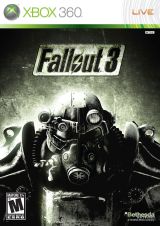GameSpy: Would you consider Fallout 3 to be a shooter with RPG elements or an RPG with shooter elements?
Todd Howard, Executive Producer: I think it's an RPG, but I never felt that certain interactions equal RPG and certain ones don't. It's about playing and developing a character, and we'll use whatever gameplay devices work towards that. I mean, what types of interactions in a game constitute an RPG anyway? Is it gaining XP, leveling up and picking perks? Because I just described Call of Duty 4. We sort of look at it this way -- we like all kinds of games, and play all kinds of games, so we'll assume most gamers do as well, and probably don't care so much about mixing it up.GameSpy: Why did you choose to set the game in Washington D.C.?
Todd Howard: Well, we're from here, so that was the first thing. Plus it's just such a great place to set a game in, especially if you're going to blow it up, and it hasn't been overdone yet. There's something unique about seeing these giant American icons in shambles and thinking to yourself "what happened?" or "how do I survive in a world like that?" It makes for some really evocative imagery. There are some vistas in the game that still give me goosebumps.
GameSpy: How accurate is the game's map when it comes to real-world locations like the Washington Monument and the Capitol Building?
Todd Howard: In relation to each other, pretty accurate. In scale, not accurate at all. We really mess with the scale of things so they feel right in-game. It's a lot more spread out in real life, but the mall area, with the Capitol, Washington and Lincoln memorials feels pretty great. It feels real, in the Fallout world. We even did a bunch of the museums there.GameSpy: Could you tell us a bit about how the follower system will work?
Todd Howard: There are a limited number of them, and they'll only join you if you match their karma. Bad guys will only come with you if you are bad, and so on. They run a pretty good gamut in terms of their play styles and personalities. They're not easy to get either, so it's a pretty big benefit to have one. They'll fight for you, comment on things, they can help carry your stuff, you can outfit them with weapons and armor. But, you do have to help keep them alive, so in some ways they can become a big resource drain too.GameSpy: Could you describe to us the design philosophy behind balancing S.P.E.C.I.A.L. attributes versus skills versus perks? Is there some mystic formula, or did you just have fun with it?
Todd Howard: Much of it is a holdover from [the first] Fallout, but I can tell you how we tried to approach it. The SPECIALs are more "innate physical stats" and are hard to change throughout the game. They're approached as things you can't really learn easily, like how strong you are, or inherently smart you are, things like that. Skills are things you can learn, like shooting a gun, or hacking a computer. And perks are the wildcards, and have a character theme in mind. So you get some basic perks like "Gun Nut" that boost a gun and repair skill at the same time, and then you get some crazy ones like "Mysterious Stranger," my personal favorite.





